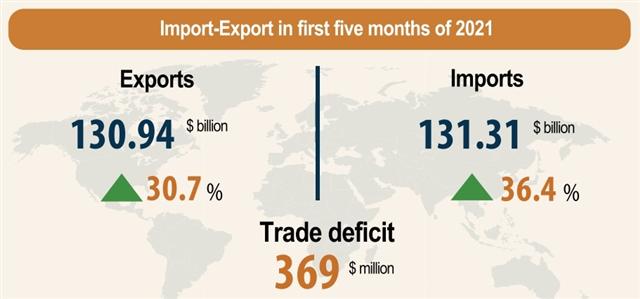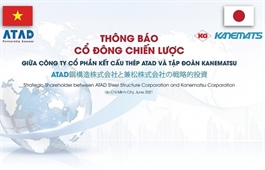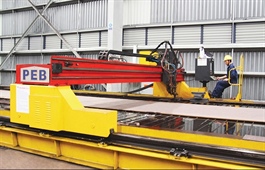Raw material price hikes affect trade
Raw material price hikes affect trade
After months of continuous trade surplus, Vietnam witnessed the return of a trade deficit in May, but it is too early to conclude whether this represents a new trend in the balance of trade though a bumpy road remains ahead for businesses.
|
According to the General Statistics Office of Vietnam (GSO), the country earned $26 billion from exports and spent $28 billion on imports in May, up 35.6 and 56.4 per cent on-year, respectively. This means a trade deficit of $2 billion.
In the first five months of the year, Vietnam saw a trade deficit of $370 million when its exports increased 30.7 per cent on-year to $130.94 billion, and imports climbed 36.4 per cent on-year to $131.31 billion. Meanwhile, Vietnam recorded the latest trade deficit in first two months of last year with $176 million.
According to experts, such a trade deficit in May and in the first five months still demonstrated a good signal as exports kept increasing and imports followed suit. The main reason for this is the strong recovery of domestic production, leading to large demands for input imports.
The GSO announced the structure of imports in the first five months of the year. Accordingly, value of goods imported for production was estimated at $123.15 billion or 94 per cent of the total imports of the economy, up 36.8 per cent on year. In which, the group of machinery and equipment, transport, and spare parts reached $58.8 billion, up 33 per cent, and the group of raw materials, fuel, and materials reached $64.35 billion, up 40.5 per cent. Meanwhile, consumer goods came out at $8.16 billion, up 29.5 per cent.
Le Tien Truong, chairman of state-run Vinatex, told VIR, “Since December, the price of yarn has increased by about 20-25 per cent, putting textile and garment makers under pressure. So, to overcome the current difficulties, businesses like us have to increase the stock of raw materials for production, avoid shortages, and increase prices”.
The trade deficit reflects Vietnam’s high dependence on imported input materials in the processing and manufacturing sector. China was the largest supplier to Vietnam with $43.3 billion, surging by 53 per cent, followed by South Korea, ASEAN, Japan, the European Union, and the United States in last five months.
The dependence on imported raw materials represents a burden for enterprises. For instance, in the first five months, domestic steel prices increased sharply by nearly 50 per cent on-year, which is the result of the dependence on imported raw materials.
Ho Duc Lam, chairman of the Vietnam Plastics Association, said that domestically produced materials only meet about 15-25 per cent of the demand, and the remainder depends on imports.
In the context of the pandemic, supply chains have been disrupted, directly affecting industries that must import materials and equipment. Thus, some enterprises must import more materials due to supply chain disruptions and focus on inventory management.
The most recent COVID-19 wave in Vietnam has hit several industrial zones (IZs) in the northern provinces of Bac Ninh and Bac Giang as well as the central city of Danang, all of which were previously listed in the top 10 localities that benefitted from investment flows into the country. For instance, Bac Ninh is home to global groups such as Samsung and Canon – and Vietnam accounts for roughly half of the former’s global phone and tablet production.
The index of industrial production of this province decreased slightly by 2.2 per cent in May compared to the previous month.
Vietnam is now battling an outbreak that causes most factories to run below their capacities, and the resumption of production and exports are part of the state’s efforts to reach the dual targets of ensuring workers’ income, attracting more investment into IZs, and contributing to socioeconomic development.
Tran Thanh Hai, deputy director of the Ministry of Industry and Trade’s Agency of Foreign Trade said that exports will still face many difficulties. In addition, input costs such as logistics and materials have increased, while the shortage of empty containers will continue negatively affecting exporters.



























